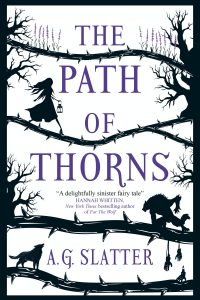Charles Payseur Reviews Short Fiction: Strange Horizons, Cast of Wonders, Hexagon and Flash Fiction Online
 Strange Horizons 11/13/23, 11/20/23, 11/27/23, 12/4/23, 12/11/23
Strange Horizons 11/13/23, 11/20/23, 11/27/23, 12/4/23, 12/11/23
Cast of Wonders 12/3/23
Hexagon 12/23
Flash Fiction Online 12/23
At Strange Horizons, November brought a rather chilling look at future technology with Sam Kyung Yoo’s “Nextype” (to all practical scientists reading, please do not invent Nextype). In it, Mirae has been implanted with the titular technology, a brain implant meant to give her an advantage in life – one bought, paid for, and controlled by her rather strict mother. And it works, giving Mirae tools to excel and reach the top of her class well into college and suppressing anything that might be deemed distracting. Unfortunately, that includes her brother, whose implant caused a rare condition that’s killing him – something her mother was keen to make impossible for her to remember. Yoo shows not only how easily invasive technologies like this can be abused, but also focuses on the very human ways people can be hurt, and the great power that comes from analog methods of people building support and making emotional and human connections with others. In December, Ann LeBlanc took a new twist on a classic science fiction and horror trope with “Maladaptive Camouflage”, which finds a standoff between a woman, her wife, and her wife’s replicant. Told from the point of view of the wife, the story quickly covers familiar ground – that replicants have imperfect memories of the past, that couples can quickly defeat them by having prepared certain things to say a replicant will not be ready for. In this world, replicants are a known threat, one that this couple has faced successfully before, and yet as the story progresses it becomes clear that there’s more going on than just the classic dilemma. Indeed, LeBlanc delves into the fear resting at the heart of replicant stories, and the stifling failure killing the replicant can be. The rejection of the replicant becomes a rejection of possibility and of a kind of terrifying authenticity camouflage prevents. Because it’s not only the replicant who is hiding, who is pretending, and by continuing the cycle of discovery and victory over the “imposter,” everyone remains trapped, unable and unwilling to truly embrace what’s under the masks they wear. It’s a staggering story.
The poetry at Strange Horizons was also exceptional, including lae astra’s “Binary Star System”, which focuses on change and freedom and being released from limitations. It’s paired with art from the author as well, and builds a moving picture of a natural world valued in part by the distance it has from where the narrator has escaped from. It might seem very similar, with its insects and the sound of water, but the context changes the feel, changes the meaning of those things, and so allows the narrator to experience a rush of joy and expression that wasn’t possible otherwise. There is a sense of cosmic distance, exploration, and fulfillment that astra captures masterfully. On the opposite side of the same coin, Leah Komar’s “Colony Collapse Disorder” explores how some kinds of leaving can be catastrophic. The poem moves around the idea of wanting to escape the pain of loss. The narrator continues to repeat the desire to die before anyone they love, and that fear represents a kind of emotional pathogen, a seed that grows something toxic, as the fear of loss interferes with the joy of connection and love. It shows that even when something is good, fear of losing it can be enough to destroy it, and that might be at the heart of the mystery behind colony collapse disorder, that for some people the desire to prevent a tragedy ends up leading to them into authoring one. It’s a powerful read.
Cast of Wonders kicked off December with the release of their flash fiction contest winners, including the rather sweet “Magic in the Hands” by Carol Scheina, which unfolds in a magical school and in a classroom where a sentient and magical hand has been shut away for a long time. Though largely ignored, the hand does try to communicate and offer encouragement in the form of waves and thumbs up, which seem especially needed for Tylia, who comes from a place where language is gestured rather than spoken. For things like incantations, which are taught as solely vocal, there is significant challenge, but Tylia might have figured out how to overcome those challenges… if she can find a helping hand. Scheina does a lovely job building the world and situation quickly and bringing it to a place that is less an ending and more a whole new beginning.
The latest issue from Hexagon ranges widely in genre and feel, from high fantasy to alt history to the science fiction of Monica Gribouski’s “Allies”, which is a fascinating take on alternate realities. In it, Allie is a young woman who is a bit lost – she doesn’t exactly like her life, and is mostly just passing through it – until she’s attacked by a strange man and saved by another version of herself who seems to have it all together. And this other Allie tells her that she’s just a shadow, an echo whose misery seeps across the rift between realities and distracts Allie Prime from her important duties. Before the Prime can prune Allie’s reality (and life), though, she’s interrupted, and it kicks Allie into reevaluating what she’s doing and who she wants to be. The story is original and fun for a lot more than just the clever title (though I do appreciate that as well) and Gribouski does sharp work in dissecting the idea that there might be a Prime version of our selves out there, and what it would mean for all the other versions in all the other realities. The story avoids being fatalistic and manages the impressive turn of being compelling, inspiring, and incredibly entertaining. It’s an amazing story and one of the best examples of alternate reality storytelling I have read in a while.
That said, Rachael K. Jones’s “Seven Ways to Find Yourself at the Transdimensional Multifandom Convention” in the December Flash Fiction Online is another good exploration of alternate dimensions and alternate versions of the same person. In it, Chris-P and You (Chris-U) meet up for their favorite annual event, indulging their geekier sides as they share stories and updates about the lives the other might have lived, if only. The piece mixes the fun of the convention with some deeper emotional beats, showing a connection and self-reflection (literally and figuratively) that is both joyous and a little heartbreaking. Because as much as Chris-P and Chirs-U cherish this time together, they have to return to their other, separate lives and must face the haunting specter that one year they might not both be able to attend. It’s a moving and bittersweet story.
Recommended Stories:
“Nextype”, Sam Kyung Yoo (Strange Horizons 11/23)
“Maladaptive Camouflage”, Ann LeBlanc (Strange Horizons 12/23)
“Allies”, Monica Gribouski (Hexagon 12/23)
IF YOU ENJOYED THIS REVIEW, please take a moment to support what we do! Our annual fund drive ends April 5. We must meet our funding goals to continue!
Charles Payseur is an avid reader, writer, and reviewer of speculative fiction. His works have appeared in The Best American Science Fiction and Fantasy, Lightspeed Magazine, and Beneath Ceaseless Skies, among others, and many are included in his debut collection, The Burning Day and Other Strange Stories (Lethe Press 2021). He is the series editor of We’re Here: The Best Queer Speculative Fiction (Neon Hemlock Press) and a multiple-time Hugo and Ignyte Award finalist for his work at Quick Sip Reviews. When not drunkenly discussing Goosebumps, X-Men comic books, and his cats on his Patreon (/quicksipreviews) and Twitter (@ClowderofTwo), he can probably found raising a beer with his husband, Matt, in their home in Eau Claire, Wisconsin.
This review and more like it in the February 2024 issue of Locus.
 While you are here, please take a moment to support Locus with a one-time or recurring donation. We rely on reader donations to keep the magazine and site going, and would like to keep the site paywall free, but WE NEED YOUR FINANCIAL SUPPORT to continue quality coverage of the science fiction and fantasy field.
While you are here, please take a moment to support Locus with a one-time or recurring donation. We rely on reader donations to keep the magazine and site going, and would like to keep the site paywall free, but WE NEED YOUR FINANCIAL SUPPORT to continue quality coverage of the science fiction and fantasy field.
©Locus Magazine. Copyrighted material may not be republished without permission of LSFF.







